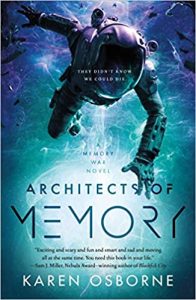Liz Bourke Reviews Architects of Memory by Karen Osborne
 Architects of Memory, Karen Osborne (Tor 978-1-250-21547-5, $17.99, 352pp, tp) September 2020. Cover by Mike Heath.
Architects of Memory, Karen Osborne (Tor 978-1-250-21547-5, $17.99, 352pp, tp) September 2020. Cover by Mike Heath.
Of late, my desire and ability to read fiction has been at a low ebb. In every professional reviewer’s career, there comes a point – or perhaps more than one – where much that is purported to be fresh and new seems to be tired, quotidian, even overdone; or worse, can’t hold a candle to something you saw several years ago, and suffers greatly by comparison.
Architects of Memory, Karen Osborne’s debut novel, is the first piece of SFF I’ve enjoyed reading for over a month. I read it in one sitting, in two hours of an afternoon, and it compelled my attention until I was done.
Osborne evokes a space opera future with a recognisably dystopian air, an exaggerated form of modern capitalism where the haves and the have-nots are divided according to who earns – or inherits – their citizenship in one of the powerful competing corporations, and who has no choice but to accept indenture contracts with the faint hope of one day earning out those contracts and becoming corporate citizens.
Ash Jackson is a salvage pilot under indenture to Aurora Corporation. Along with the rest of the small crew of the salvage tug Twenty-Five, she’s been assigned to salvage an Auroran ship lost in a battle with the alien Vai. Ash lost everything she knew to the Vai, who mysteriously retreated just as mysteriously as they appeared. On Twenty-Five, she’s begun to rebuild her life, but her relationship with the captain, citizen Kate Keller, is a fragile impossibility, and Ash is sick with a progressive, degenerative, eventu ally fatal disease. Ash isn’t about to give up: she’ll lie, beg, fight, or steal her way out of corporate indenture, find a cure, and seize her happy ending with both hands.
Ash’s world isn’t quite kind enough to let her do that. When she and the rest of Twenty-Five‘s crew salvage a strange weapon from the wreck of a battle above a dead, or mostly dead, colony – a weapon that the corporate brass are very interested in, a weapon with genocidal potential – Ash stumbles into the middle of a whole set of corporate conspiracies that may cost her what remains of her life, or worse, turn her into a living weapon herself. With betrayal on every side and no one to trust, Ash may find herself responsible for the fate of two sentient species.
Ash isn’t the only viewpoint character in Architects of Memory. Kate Keller also gets her share of the action. Kate is in a less precarious position than Ash, but she’s also in a fairly invidious situation: she’s been covering for Ash and her medical condition and doing her best to help Ash out of the indenture system, because she honestly cares for the other woman, but if she’s caught, it will go badly for both of them (though worse for Ash). When Ash uncovers the weapon that corporate headquarters is basically shitting themselves to acquire, Kate’s caught flat-footed by the intrigue and series of betrayals in whose midst she suddenly finds herself. Grieving for Ash, whom she believes is dead, she finds that she, too, may have a terminal condition – and that she may be the only person left who can prevent the weapon from being used.
This is high-action, high-octane science fiction, with daring ship-evasions in space and armed confrontations with ruthless enemies both aboard ship and in the ruins of a dead colony on-planet. Architects of Memory moves fast, like a raft in white-water rapids, and has about as much mercy for lapses of attention. Despite her novel’s intensity, though, Osborne writes with a straightforward fluidity that makes even hectic, complicated action and intrigue smooth and easy to follow. Her characters are strongly drawn individuals with distinct personalities and a sense that there’s more to them than we can see. They have histories and concerns that extend beyond the page. And both Ash and Kate are very relatable, even when they’re hard to like (and even when they’re making short-sighted choices).
I’ve always liked space opera that focused on professionals doing a job – and getting caught up in wider, weirder concerns – and like Elizabeth Bear’s Ancestral Night, Arkady Martine’s A Memory Called Empire, and Tim Pratt’s Axiom books, Architects of Memory brings us that sense of professionalism, that sense of ordinary people whose concerns and ambitious suddenly have to take a sideways turn to deal with oh shit what is that? Other people leaning in to their competence and figuring out ways to deal with the stressful and unexpected is especially satisfying when it comes painted on so big and strange a canvas.
Architects of Memory may throw in one too many betrayals and double-crosses and reverses at its (action-packed and emotional) climax, but on the whole, it’s a very entertaining book and a debut with a lot of promise for the rest of Osborne’s career. I’m looking forward to the sequel, Engines of Oblivion: I want to see where Osborne goes from here.
Liz Bourke is a cranky queer person who reads books. She holds a Ph.D in Classics from Trinity College, Dublin. Her first book, Sleeping With Monsters, a collection of reviews and criticism, is out now from Aqueduct Press. Find her at her blog, her Patreon, or Twitter. She supports the work of the Irish Refugee Council and the Abortion Rights Campaign.
This review and more like it in the November 2020 issue of Locus.
 While you are here, please take a moment to support Locus with a one-time or recurring donation. We rely on reader donations to keep the magazine and site going, and would like to keep the site paywall free, but WE NEED YOUR FINANCIAL SUPPORT to continue quality coverage of the science fiction and fantasy field.
While you are here, please take a moment to support Locus with a one-time or recurring donation. We rely on reader donations to keep the magazine and site going, and would like to keep the site paywall free, but WE NEED YOUR FINANCIAL SUPPORT to continue quality coverage of the science fiction and fantasy field.
©Locus Magazine. Copyrighted material may not be republished without permission of LSFF.






